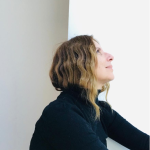Gustavo Gasparani
Gustavo Gasparani discusses Otelo da Mangueira – Part 1 of 2
Gustavo Gasparani discusses Otelo da Mangueira – Part 2 of 2
Gustavo Gasparani is essentially a “man of the theatre”. He is an actor, trained in singing and dancing, he is also playwright, director, adapter, producer and theater teacher. He founded two of the main theater groups in Brazil, Cia dos Atores. He directed shows with greatest names of Brazilian Popular Music. Gasparani’s many musical shows have earned him more than a hundred award nominations and have been the subject of master’s theses and doctoral dissertations in Brazil and abroad. Within the universe of Shakespeare, Gustavo mounted the musical Otelo da Mangueira in 2006, on which we have extensive material, Ricardo III, Romeu e Julieta ao Som de Marisa Monte (2018) and premiered Julius Caesar in 2023 with Cia dos Atores.
Marcia Martins
Marcia Martins discusses Brazilian Translations of Shakespeare
Marcia Martins holds a PhD in Communication and Semiotics from PUC-SP and did a post-doctoral internship at Queen Mary University of London. She was an Associate Professor at the Department of Letters at PUC-Rio until 2022, where she taught both translation practice and theory at undergraduate and graduate levels. She is Brazil’s leading specialist in translations of Shakespeare’s plays into Brazilian Portuguese. Her main research interests are historiography of translation and translations and adaptations of Shakespeare’s works in Brazilian Portuguese.
An essay by Marcia Martins – Translating Shakespeare for the Brazilian Stage
Fernanda Medeiros
Fernanda Medeiros discusses adaptations and appropriations of Shakespeare in Brazil
Fernanda Medeiros is Associate Professor of English at Universidade do Estado do Rio de Janeiro and has done a lot of research on Shakespeare for the past 16 years. Her research focuses on adaptations and appropriations of Shakespeare by contemporary Brazilian prose fiction authors and also on Shakespeare in rhetorical culture and Shakespeare’s female characters. She was co-editor of the issue dedicated to Shakespeare in the journal Tradução em Revista and of the collection O que você precisa saber sobre Shakespeare antes que o mundo acabe (What You Need to Know about Shakespeare Before the World Ends).
Lawrence Flores
Lawrence Flores discusses King Lear and its translation
Lawrence Flores is a translator, poet and Professor at the Federal University of Santa Maria. He holds an M.A. from the Federal University of Rio Grande do Sul and a PhD from the Pontifical Catholic University of Rio Grande do Sul. He did his post-doctoral research at the University of Massachusetts. He translated Sophocles, T. S. Eliot, Baudelaire, Wallace Stevens, Emily Dickinson and Robert Músil. His recent translations of the plays by William Shakespeare, Hamlet, King Lear and Othello, published by the Penguin/Company collection, have received critical and academic acclaim. His translation of Hamlet won first place at the Jabuti Award in 2017 .
Barbara Heliodora
Video selections are from the Shakespeare Brasil UFPR YouTube Channel.
Barbara Heliodora: Shakespeare’s trajectory as an author
Barbara Heliodora talks about Shakespeare and Elizabethan Drama
Barbara Heliodora on Shakespeare and Elizabethan Theater
Barbara Heliodora (1923-2015) was a renowned theater critic, translator, teacher and writer. She was Brazil’s leading authority in Shakespeare. She translated the complete works of Shakespeare,William Shakespeare. Teatro Completo (2017). She had a BA in English Language and Literature at Connecticut College, in the United States, and a Doctorate in Arts at the University of São Paulo. She was a professor of Theater History at the School of Letters and Arts of the University of Rio de Janeiro. Among her books on Shakespeare are: “The Dramatic Expression of the Political Man in Shakespeare”, “Speaking of Shakespeare”.
Heliodora faced many challenges throughout her work as a translator of Shakespeare’s plays into Brazilian Portuguese. Her main concern was “to search for a fluent Brazilian Portuguese music and rhythm that might be acceptable as “the nearest equivalent” to the original” (Heliodora 236)[1]. In recreating Shakespeare’s texts, she was interested in their performability, never losing touch with the fact that Shakespeare was first and foremost a man of the theatre. Heliodora also believed that by preserving, as much as possible, the prose, the rhyme, the white verse, and other metrics from the original, she would be able to mirror the kind of economy and rhythm characteristic of Shakespeare’s language so that “something of the translation might remain at least near the dramatic poetry that Shakespeare wrote” (236). Eschewing the option to convert Shakespeare’s early modern English into a classical Portuguese vernacular of 400 years ago, Heliodora defended the argument that the language should nevertheless be elevated while maintaining a sense of effortlessness and identification that one finds in one’s own language.
Heliodora famously repeated in her spirited classes and conferences that the English playwright “had a love affair with humanity”. The same could be said of her – her life-long love for the English bard, along with her unparalleled knowledge of Shakespeare’s theatre have become one of the most popular means of transmission of Shakespeare’s plays in Brazil.
Marta de Senna
Marta de Senna talks about Machado de Assis and Shakespeare.
Marta de Senna holds a B.A. from the Federal University of Rio de Janeiro (UFRJ), an M.A. and a Doctorate in literature from UFRJ and King’s College London. She did her post-doctoral research at Oxford University. She is a retired Professor of Comparative Literature at Universidade Federal do Rio de Janeiro (UFRJ). She is a researcher at Fundação Casa de Rui Barbosa. She is Brazil’s specialist in Machado de Assis, considered by many the greatest Brazilian writer of all time. She has published and edited several books, mainly on Machado de Assis.
Lucia Castanho
An Interview with Visual Artist Lucia Castanho
 Lucia Castanho is a Brazilian artist, with a doctorate and experience in teaching art and design. She lives and has a studio in Sorocaba, São Paulo state. She occupies a space of cultural leadership in her city, being engaged in the development of the local artistic community — in particular, as the head of the Education, Culture and Art Association. Castanho’s works center on the figure of Ophelia to discuss issues of the female body, repression and silence. Her works showcase visceral images of the Shakespearean character in multiple artistic modalities such as photos, paintings, video performances and objects. The artist’s works have been exhibited since 1986 and are part of Museu de Arte de São Paulo — MASP; Museum of Modern Art of São Paulo — MAM; Museum of Contemporary Art of the University of São Paulo — MAC-USP.
Lucia Castanho is a Brazilian artist, with a doctorate and experience in teaching art and design. She lives and has a studio in Sorocaba, São Paulo state. She occupies a space of cultural leadership in her city, being engaged in the development of the local artistic community — in particular, as the head of the Education, Culture and Art Association. Castanho’s works center on the figure of Ophelia to discuss issues of the female body, repression and silence. Her works showcase visceral images of the Shakespearean character in multiple artistic modalities such as photos, paintings, video performances and objects. The artist’s works have been exhibited since 1986 and are part of Museu de Arte de São Paulo — MASP; Museum of Modern Art of São Paulo — MAM; Museum of Contemporary Art of the University of São Paulo — MAC-USP.
(Artist’s site https://luciacastanho.wordpress.com/page/5/)
Martha Werneck

Martha Werneck holds B.A. in Painting, as well as M.A. and PhD degrees in Visual Arts from the School of Fine Arts at UFRJ. She is an Associate Professor at the Graduate Course in Painting EBA UFRJ, where she has been a tenured professor since 2010 in both practical and theoretical disciplines and guidance. Her research focuses on the representation of the female body in contemporary painting and on new image technologies. Her work spans painting, photography and digital image.
(Artist’s site https://www.anomia.art/exposicoes)

